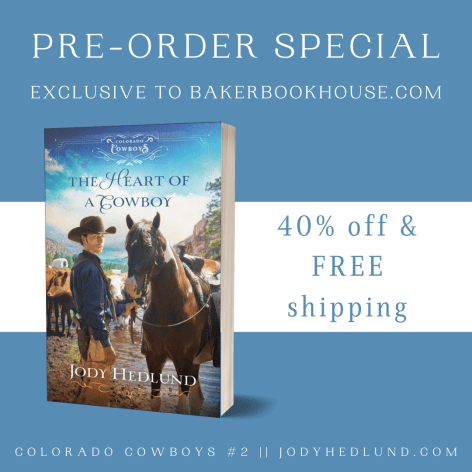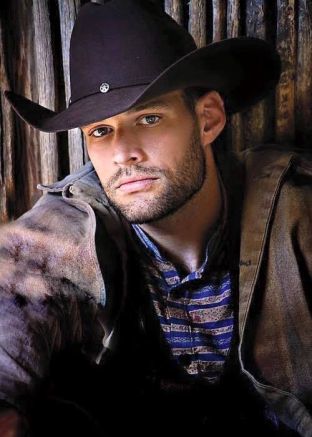
Lately I’ve been in editing mode. I just completed rewrites on Never Leave Me, the second Waters of Time book, releasing early next year. (The first book in the series, Come Back to Me, releases in just a few months!)

After turning it in, I jumped into a line edit for my second Colorado Cowboy book, The Heart of a Cowboy, releasing in October of this year (which, by the way, you can pre-order for a really great deal through BakerBookHouse.com )

When I finish this particular book, I’ll be self-editing the third Colorado Cowboy book before turning it in to my publisher. (And here’s my working image of the hero of book three, Brody McQuaid. Nice, huh?)

My brain hurts from so much editing. In fact, some nights I wake up with dreams of editing!
For all those like me who get confused on the different types of editing, here’s the order a book usually goes through on the way to publication:
Self-editing: Making changes before turning the manuscript into a publisher or professional editor.
Rewrites: (aka Substantive or Macro edits): Focusing on big-picture changes in plot, character arcs, etc.
Line edits: Looking for medium issues, repetitions, accuracy, etc.
Copy edits: Checking for small details like consistency, punctuation, spelling, grammar
Proofing: Nit-picking for tiny mistakes (usually missed or additional words)
Some authors or publishers may combine two of the above. For example, one of my publishers does both line and copy edits at the same time. Other editors combine rewrites and line edits.
Overall, most books go through multiple levels of intense editing, and the author is involved in every stage, re-reading the entire book for each edit with the end goal of bringing it to a place of near perfection.
The bottom line is that every book needs multiple edits. While friends and family can certainly help along the way, nothing (and I do mean nothing) can help like a good editor.
You may be asking what goes into making a good editor?
I have worked with many, many different editors over the years, and I’ve experienced a wide spectrum of styles, temperaments, and abilities. Through the process, my skin has thickened immensely. I can take quite a bit of criticism. Even so, I don’t like when editors:
Make snarky comments or putdowns. There’s a kind way to say everything. Brow-beat a certain “mistake” over and over. Pointing out the issue a few times early on is enough. Mentioning it all throughout is overkill (and getting frustrated is not helpful).Let personal beliefs/values ooze into the edit in such a way that it stifles the author’s voice. Or isn’t familiar with the author’s voice enough to respect it.Gloss over the book without changing enough wording or giving enough feedback.Micromanage the wording (especially without any rhyme or reason so that the author is always wondering why things were changed).
Obviously there’s no perfect editor the same way there’s no perfect author.
But over time, I’ve learned the qualities I value (and that will likely vary from author to author). For example, I love when an editor isn’t afraid to mark up my manuscript, but who does so with sound reasoning. I love when my editor takes the time to teach me the rules behind changes (so that I can make an effort to improve my skills). I love during rewrites when an editor offers suggestions and helps brainstorm new ideas. I love when an editor is able to highlight my repetitions and help me find ways to trim them.
In summary, I truly value the editing process, especially when I get to partner with a skilled editor. Even though editing is intense and takes a lot of work, it’s something I never skimp on because I want to offer readers the best book I possibly can.
How about you? Readers, how important do you think editing is? And writers, what advice do you have for anyone seeking an editor?
 newest »
newest »
 newest »
newest »
 Editing is hugely important - sometimes neglected, or not enough attention paid to the process. When an author gives me the same throw away fact for the second or third time, I can do my nut. It is usually something that contributes to the story, but does not require repetition - especially not in the identical words.
Editing is hugely important - sometimes neglected, or not enough attention paid to the process. When an author gives me the same throw away fact for the second or third time, I can do my nut. It is usually something that contributes to the story, but does not require repetition - especially not in the identical words.







